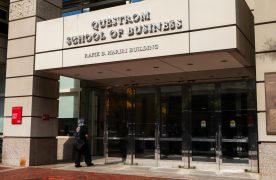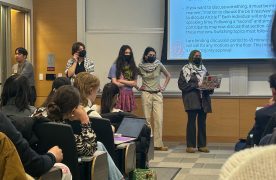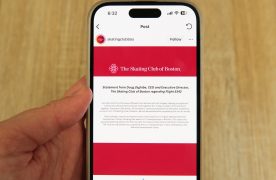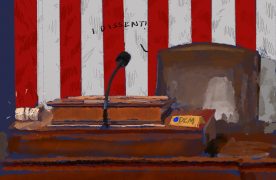It can be tough these days to find businesses that aren’t part of a massive chain. With such large name brands competing for consumer attention and business, it is rather easy for the smaller, independent shops to go unnoticed and unappreciated.
With a Dunkin’ Donuts on practically every block of the city, Boston, of course, is no exception to the trend.
But finding such diamonds in the urban rough is worth the search. Because unlike large businesses, these local eateries and bookstores can make stronger connections with their customer bases, right down to the candidates their loyal patrons choose in the ballot box.
COFFEE MAKES THE WORLD GO “ROUND
Blue State Coffee is one of those local businesses. As the name would suggest, the coffee shop is dedicated to making progressive change. Drew Ruben founded the company in 2006 and the business took hold around the idea of channeling sales into donations for progressive groups.
“The initial thought came when I was a sophomore in high school,” Ruben said, “Why can’t businesses be politically active? The initial problem was just, “why not’?”
Boasting several locations &- including one at 957 Commonwealth Ave., in the heart of Boston University’s West Campus &- each store donates to a different cause.
Blue State Coffee has four other locations as well &- two in Providence, R.I., two in New Haven, Conn.
Quarterly, the stores donate five percent of sales to a group selected by their customers. From a list of proposed candidates, the patrons vote on which organization the store should help fund. These groups are typically local, each location focusing on groups within its respective community. Based on popular issues or community concerns, four groups are to be eligible candidates at each store.
“We realized that a few dollars toward a local business was much more effective than donating to a national cause,” he said.
These groups often vary from environmental and educational issues, but always have a progressive outlook. Nevertheless, the shop itself is not affiliated with any particular political party or advocacy group.
“The groups are selected by the customers,” said Ryan Ludwig, the manager of Blue State on Comm. Ave. “[There is] no particular party affiliation.”
Blue State’s website does, however, list ActBlue as one groups to which it donates a portion of its online sales. The organization is dedicated to helping Democratic candidates across the nation raise money online, according to the ActBlue website.
But as for the local shops, their customers are free to choose to donate to whatever cause they wish.
Upon purchasing something, customers are encouraged to place a wooden coin into one of several jars, each representing a different organization, movement or group that is in need of funds. This integration of the democratic process into buying coffee makes a trip to Blue State more than just a transaction, but an experience.
The shop also prides itself on being environmentally friendly.
“I would say a pretty much everything that goes into the customer’s hand is recyclable,” Ludwig said.
In addition, Blue State aims to provide organic ingredients. Many beans are purchased through fair trade with coffee bean farmers in Latin America.
The shop itself is filled with typical cafe decor. Tasteful art, soft music and cozy atmosphere provide customers with a welcoming, comfortable environment to work, study or to just enjoy a bite to eat.
“I can get a lot of work done here,” said Ashley Michael, a customer who visits the shop twice a week. “I like the atmosphere and the concept of them donating five percent of sales to charity.”
However, it is quite apparent that when competing against established chains, pricing becomes an important consideration. Businesses such as Blue State have their work cut out for them when it comes to offering good products at reasonable prices.
The menu offers an array of hot drinks, pastries, snacks, breakfast items and even sandwiches. Most items list at about four to five dollars.
Frequent customers can save on their purchases by bringing mugs purchased at the shop. The shop also sells merchandise like thermoses, coffee mugs and beans of Blue State’s own blend for those who prefer to brew their coffee at home.
READ READ FIGHT THE POWER
Big, chain bookstores don’t always have the specific books their customers need, but this is where independent booksellers come in. Not only do they catch the books that fall through the proverbial cracks, but they also provide a resource for books that are unlikely to make The New York Times best-seller list.
The Lucy Parsons Center, formerly called Redbook, is such a store.
Nestled inconspicuously at 549 Columbus Ave., the Center is a retailer of literature of the progressive movement. Formerly situated in Cambridge, the store has made many moves and transitions before finally coming to reside in the South End of Boston.
Established in the 1960s, Redbook, like many other radical bookstores, was a haven for underground newspapers, films and activists looking for a good read and a place to share their ideas.
Now, named after the anarchist who wrote “The Principles of Anarchism,” the store specializes in literature that is considered socially sensitive.
Perhaps the most interesting thing about the store itself is that it is not-for-profit. For 40 years, the store has had few employees. Even then, these employees were paid very little.
Now it is staffed by volunteers with support of many Bostonians to keep it in existence.
Although not claiming to belong to any one party, the store attempts to provide insight into leftist ideologies, manifestos and systems of thought. Books on feminism, anarchism, radical thought and socialism line the shelves.
“Our official mission is the provision of material, literature and education that document the progressive movement,” said Chas Hanlon, a volunteer at Lucy Parsons.
A customer may be sorely disappointed, however, if he or she asks to see a manager. The store has no management, in accordance with its founder’s stance on authority. Although unorthodox, this does show a strong sense of dedication to its mission statement by creating a consensus-based business.
The store itself is humble yet inviting. A small reading room in the anterior provides ample space to ponder over items before buying. Posters, fliers, banners and flags representing “radical” ideologies decorate the place.
The store’s stock comes from various sources, Hanlon said.
“We make major decisions by voting on them through a consensus,” he said. “We buy books but also accept book donations. We also have distributors we buy books from.”
The store is successful due to its unique collection.
“I suppose there are books you can’t get at other book stores,” said a customer who only identified himself as Randy.
Bostonians have been campaigning for years to keep the bookstore afloat both politically and financially. Despite attempts to censor such reading material, it is obvious that the Lucy Parsons Center is here to stay.
This is an account occasionally used by the Daily Free Press editors to post archived posts from previous iterations of the site or otherwise for special circumstance publications. See authorship info on the byline at the top of the page.













